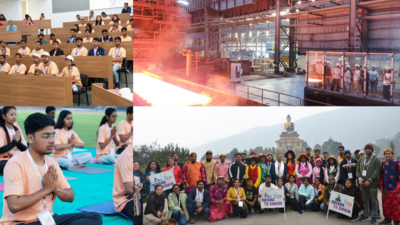
Yuva Sangam Phase 5: The Ministry of Education has extended the registration deadline for Yuva Sangam Phase 5 until October 25, 2024. According to the official notice, this extension was made following a surge in traffic to the registration portal as the previous deadline approached.
Interested individuals can access the registration link and find more details on the official website at ebsb.aicte-india.org.
Yuva Sangam Phase 5: What is Yuva Sangam?
Yuva Sangam is a government initiative aimed at fostering people-to-people connections among youth from various states and union territories of India. This programme is open to youth aged 18-30, including students, National Service Scheme (NSS) and Nehru Yuva Kendra Sangathan (NYKS) volunteers, as well as employed and self-employed individuals.
Yuva Sangam Phase 5: Eligibility for the Programme
Eligible participants include students (both on-campus and off-campus), NSS/NYKS volunteers, young professionals, and individuals enrolled in skilling institutions or online courses. The programme offers multi-dimensional exposure across five key areas, known as the 5 Ps: Paryatan (Tourism), Parampara (Traditions), Pragati (Development), Paraspar Sampark (People-to-people connect), and Prodyogiki (Technology).
Here’s the direct link to apply
Yuva Sangam Phase 5: Programme Details
For Phase 5 of Yuva Sangam, 20 prominent institutions across India have been selected to lead the exchange. Participants will visit their paired states or union territories, facilitated by the nodal higher education institutes (HEIs) of each state/UT.
Launched under the Ek Bharat Shreshtha Bharat initiative, this cultural exchange programme provides young people with the opportunity to engage in cross-cultural interactions. Now in its fifth phase, Yuva Sangam has already benefited 4,795 youth through 114 tours, fostering greater understanding and collaboration across India.
Yuva Sangam Phase 5: What is meant by cultural exchange?
As part of the cultural exchange program, participants from each state are paired with a corresponding state to promote cross-cultural understanding and collaboration. Individuals from State 1 will engage with those from State 2, and vice versa, fostering rich exchanges of heritage, education, and traditions. Below is the list of states and their respective partner institutions:
This pairing will allow participants to experience the diversity of India through academic, cultural, and regional exchanges.

